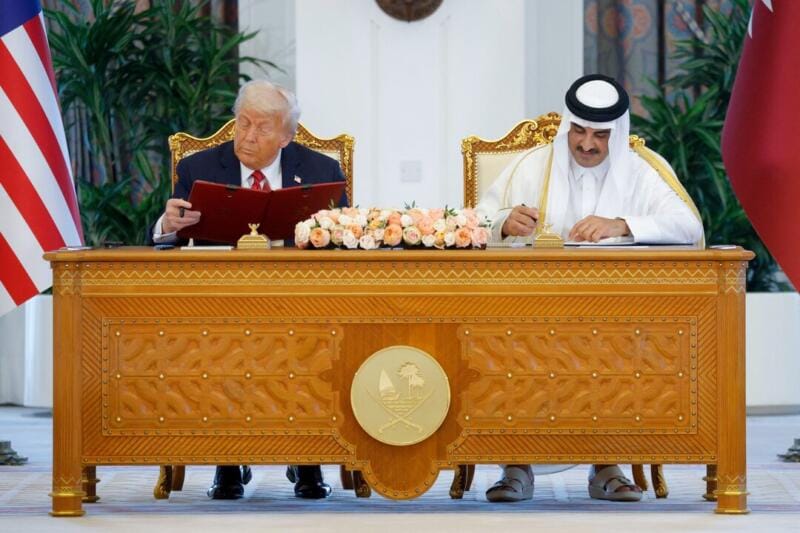EduInvesting | 15 May 2025
While most countries are busy debating interest rates or fighting over TikTok bans, the United States just pulled a classic Biden-era foreign policy power move: they shook hands with Qatar — and not just any handshake — one worth $1.2 trillion.
Yes, trillion, with a “T”, like the number of finance bros trying to short Tesla this month.
This massive agreement spans defense, energy, aviation, and infrastructure, and has Wall Street analysts nodding approvingly while sipping oat milk lattes. But beneath the headlines lies a big question:
Is this genuine economic cooperation — or a geopolitical ‘clap back’ at China disguised as a trade deal?
Let’s break it down, Edu style.
🤝 The Deal: What Just Happened?
On May 13, the U.S. and Qatar signed a package of strategic economic cooperation agreements at a joint summit hosted in Washington D.C.
| Category | Key Elements |
|---|---|
| Defense | Arms sales, joint tech development |
| Energy | U.S. firms to support Qatar’s green energy push |
| Infrastructure | Smart cities, logistics, ports |
| Aviation | Boeing & Raytheon contracts for Qatar Airways |
| Investment | Qatar Sovereign Fund commits billions to U.S. |
📈 Estimated Size: $1.2 trillion over 10 years
📍 Impacted Companies: Raytheon, Boeing, ExxonMobil, BlackRock, Tesla Energy (rumored), Bechtel, Microsoft Cloud
This isn’t a single transaction. It’s a multi-sector love affair, with both countries swapping assets, influence, and definitely a few overpriced canapés at the signing ceremony.
🧠 What Does This Mean for the U.S.?
In plain English? It’s like having
a rich Gulf uncle who finally agreed to back your startup after ghosting you for years.
Benefits to America:
- More exports (especially defense & tech)
- Job creation in aerospace, manufacturing, green energy
- Counterweight to China’s BRI (Belt and Road Initiative)
- Control over Gulf digital infrastructure (cloud, AI, data security)
Strategically, the U.S. is re-establishing dominance in the Middle East through economics, not war. A refreshing change from, well… the entire 2000s.
🏝️ Why Qatar Is the Chosen One
Let’s not act like Qatar’s doing this out of love. They know the game:
| Qatar’s Motive | Real Talk Translation |
|---|---|
| Diversify economy | “Oil is nice, but let’s not go broke in 20 years.” |
| Attract U.S. tech + cloud | “Please, Bezos and Satya, bring your data centers.” |
| Become Gulf’s innovation hub | “Let Dubai have Burj Khalifa. We want chips.” |
| Get more military hardware | “Just in case Saudi gets weird again.” |
Qatar is using U.S. capital, companies, and cloud to future-proof its monarchy.

